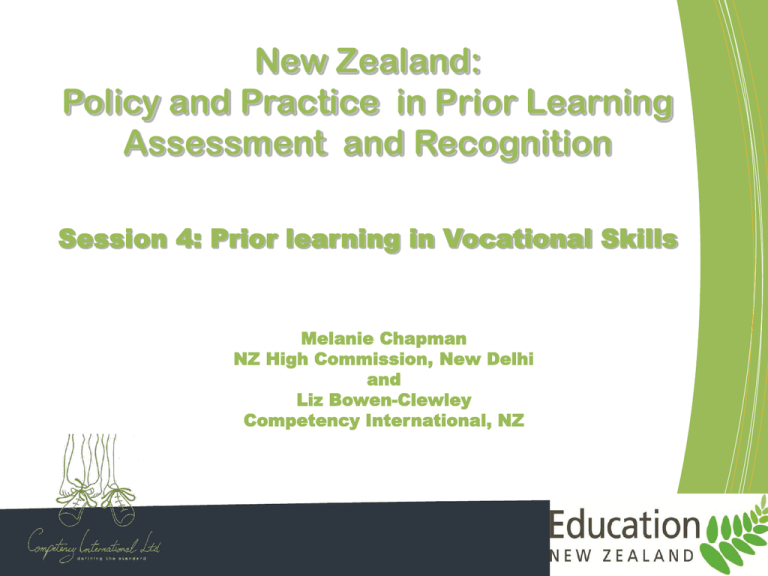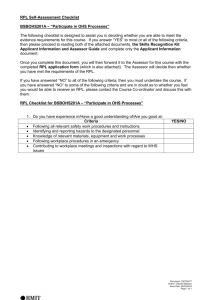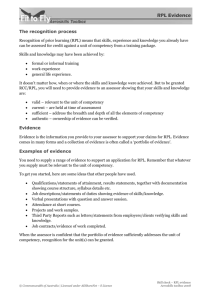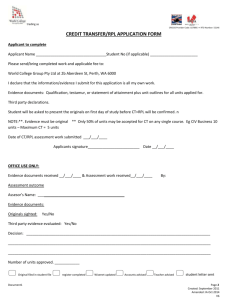Ms. Melanie and Ms. Liz Bowen
advertisement

New Zealand: Policy and Practice in Prior Learning Assessment and Recognition Session 4: Prior learning in Vocational Skills Melanie Chapman NZ High Commission, New Delhi and Liz Bowen-Clewley Competency International, NZ New Zealand: features The vocational system is essentially a tri-partite relationship between industry, government and institutions Takes a life-long learning approach which is ‘learnercentric’, is outcomes focussed, and accepts that learning and assessment can take place anywhere Experienced in designing, implementing and continuously improving a national qualifications framework (20 + yrs) A Prior Learning policy has been in place for 10 yrs: Prior Learning policy and practice is underpinned by a set of principles Supporting Learning Pathways: Credit Recognition and Transfer Policy ‘Tripartite’ vocational system The vocational system is essentially a tri-partite relationship between industry, government and institutions Government provides performance-linked funding to institutions and Industry Training Organisations (ITOs), through a regular Investment Plan Process Eg. Industry directly, or through ‘peak’ Industry Training Organisations, may identify a vocational training need and work in partnership with institutions to define, develop and deliver a programme or qualification. Approach to vocational learning New Zealand takes a life-long learning approach which is ‘learner-centric’, and accepts that learning can take place anywhere and be assessed anywhere New Zealand Qualifications Framework Qualification Outcome Statement Used by employers and other tertiary education organisation for comparing qualifications, and indicate the minimum achievement expected from a qualification Each outcome statement must include information on Graduate pathways Education pathways Employment pathway or contributions to the community New Zealand and Prior Learning A ‘common credit currency’ is the basis for a credit recognition and transfer policy The key to recognition/assessment of Prior Learning is the ability to make consistent judgements against qualification outcomes. NZQF focuses on three approaches for consistency setting standards against which courses are developed assessing achievement of these standards against criteria moderating the assessment Supporting Learning Pathways: Credit Recognition and Transfer Policy document (2002) http://www.nzqa.govt.nz/assets/Studying-in-NZ/Tertiary/creditpolicy.pdf Rationale for RPL and its professional practice Provides opportunity for employers and individuals to: Capitalise on what has been learned already – saves time and resources Gives formal assessment of previously unrecognised skills and knowledge Build confidence and motivation and thus encourage ongoing learning and development Develop workforce capability through up-skilling or updating qualifications for improved employment opportunities / industry outcomes. Address skill shortages. Principles underpinning RPL RPL is a valid method of enabling individuals to claim credit for competency standards and/or qualifications, irrespective of how their learning took place. There is no difference between the achievement of the learning outcomes and assessment criteria through prior learning or through a formal programme of study. RPL policies, processes, procedures, practices and decisions should be transparent, rigorous, reliable, fair and accessible to individuals and stakeholders to ensure that users can be confident of the decisions and outcomes of RPL. Assessment methods for RPL must be of equal rigour to other assessment methods and relate to the evidence of learning. They should be equitable, culturally inclusive, fair, flexible, valid, sufficient and authentic. Principles underpinning RPL There is no one RPL model that is suitable for all qualifications and all situations. In particular, different sectors give rise to different models. The model of RPL that is implemented must be aligned with the outcomes, goals and objectives of the qualification. RPL will be more accessible to the individual if there is consistency in definition across sectors. The process of assessment for RPL is subject to the same quality assurance and monitoring standards as any other form of assessment. The award of credit through RPL will not be distinguished from any other credits awarded. RPL assessment should be structured to minimise costs to the individual. Principles underpinning RPL RPL is a learner-centred, voluntary process. The individual should be offered advice on the nature and range of evidence considered appropriate, to support a claim for credit through RPL, and be given guidance and support to make a claim. This information and support should be actively promoted among employers, easy to understand and recognise the diversity of learners. Funding models should not impede the implementation of RPL. Challenges Shifting paradigms to recognise the validity of the processes Overcoming literacy issues Developing user-friendly, supportive processes Empowering and assisting applicants to collect evidence Training assessors to use the processes – often those who aren’t educators Recognising that not all workplace/informal learning is automatically of high or even sufficient standard


